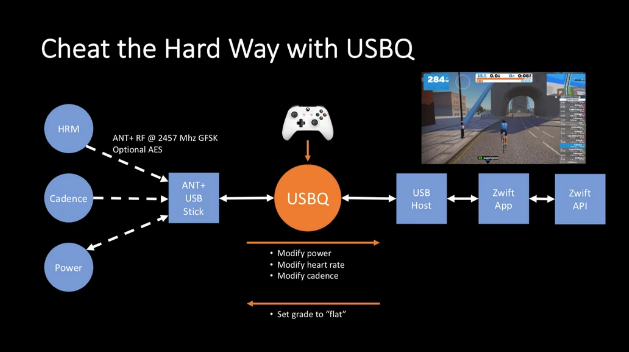That is on the grounds that Dixon isn't generally cycling. Rather, he's cheating Zwift, a well known game and 'shrewd mentor.' Zwift permits cyclists to contend in virtual universes by expelling the back wheel of their genuine street bicycle and connecting the remainder of the casing to stationary "coach," a gadget that controls the obstruction of the bicycle and uses sensors to at last ascertain their speed. You can consider it like World of Warcraft, just for riding bicycles as opposed to killing mythical beasts.

Dixon, a security expert from cybersecurity firm Carve Systems, explored how to control the information heading out from the bicycle to Zwift, fooling the framework into believing he's accelerating rapidly while not really practicing by any means.
"At last I have a Xbox controller I can use to press the trigger, make the little person in the screen pedal harder, and I could [put it on] journey control as well, since who doesn't have to get off and get yourself a brew or something while at the same time riding," Dixon told Motherboard in a video call. On Sunday, Dixon exhibited his examination into Zwift and the virtual bicycle race biological system at the yearly hacking gathering Def Con in Las Vegas.
For the PC to decide the rider's yield, they need to enter their weight and tallness into the framework—lighter riders speed up. At that point while riding, different sensors take readings which are then passed by means of the ANT+ convention to the PC. Dixon clarified that he utilized the open source toolbox USBQ on a little Beaglebone Black board, like a Raspberry Pi, to capture and change those readings. This basically put Dixon between the sensors and the Zwift application.
"Our goal from a specialized point of view is to have the option to adjust what's known as the 'prompt force perusing' from the mentor, with the goal that we lie to Zwift, and persuade it we're accelerating extremely hard," Dixon said.
The examination didn't abuse a weakness in Zwift, as much as it exploited how the framework capacities in general.
"It's inaccurate to state that I hacked Zwift, on the grounds that I didn't really. There's not a helplessness in there," Dixon said. "I don't think there is anything for them to fix. It's simply the idea of the sensors that they're utilizing and how it functions are exploitable."
Mike Zusman, Carve Security's CEO and an energetic cyclist, put the hacking into a more extensive setting of cheating in cycling, with organic doping, and afterward cheating precisely by controlling a bicycle to be quicker during rivalry.
"At that point we find a good pace Zwift, and online virtual cycling, which sorts of arranges everything," he told Motherboard in the video call. "Cycling and cybersecurity crashed for me."
For sure, Zwift as of now observes some cheating. Derek Mead, VICE's very own official supervisor and genuine Zwift and cycling devotee, said in a GChat message "Everything in cycling depends on capacity to-weight proportion, I can deliver X measure of watts for 10 minutes while hauling my bicycle and my entire ass up a slope."
"So you have swindling geeks who care this much about Zwift going in and saying they weigh 50kg, when they really weigh 80kg," he included.
"Essentially, nobody believes anybody and everybody should swindle more. I need to connect a cruiser to Zwift so I can go 8,000 miles 60 minutes," he said.
Zwift pays attention to cheating, as per Chris Snook, PR administrator for the organization.
"We have known about the conceivable outcomes of this kind of undermining Zwift for some time, and we work under the supposition that there are some rotten ones who might be effectively occupied with this kind of cheating. We have been seeking after various ways to deal with handling this issue, and have been doing as such for quite a while," he wrote in an email.
Snook highlighted Zwift Accuracy and Data Analysis (ZADA); in rivalries riders need to finish various assessments to guarantee the precision of their information, for example, open air field testing
"Cheating is something all games are tested by and Zwift is no special case. Reasonable play is critical to us. To guarantee rivalry results are real, yet similarly as critically, to guarantee rivalry is a good time for by far most of those utilizing the stage to race decently," he included.
It's conceivable to undermine your exercises, if that is the thing that you want to do. It may be conceivable to improve a cyclist in online races with these strategies, inside cutoff points, however it might be hard for a programmer to fly under the radar.
"In case you're Joe Schmoe, that no one's at any point known about previously and you're putting out master visit level wattage, individuals are going to scrutinize that," Zusman said. Dixon said he didn't utilize his methodology in any rivalries—he would not like to disturb individuals who pay attention to this game.
It's far-fetched a programmer at a genuine in-person rivalry could pull off Dixon's methodology, be that as it may. It requires a bit of equipment to block the sensors' information, which may get saw by spectators.
In any case, if your programmer companion begins putting out significantly more cycling force than you, possibly you should investigate. "It is extremely unlikely I can stay aware of Mike on Zwift; this is my solitary expectation," Dixon said.
